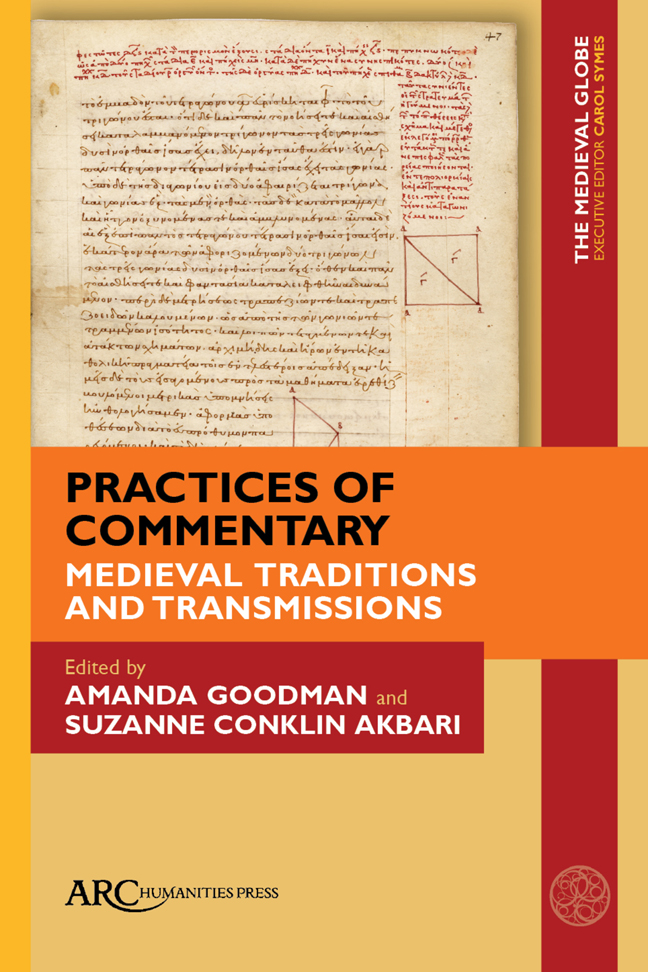Book contents
- Frontmatter
- Contents
- List of Illustrations
- Introduction: Commentary at the Crossroads
- Graeco-Roman Commentary Beyond Alexandria: Problems and Prospects
- From Plane to Space: The Narrative Arc of a Byzantine Mathematical Manual
- Periodization in the Sunni Qur'an Commentary Tradition: A Chronological History of a Genre
- On the Practice of Autocommentary in Sanskrit Sources
- Oral Commentaries and Scholarly Debates in Sanskrit Philosophy
- On the Nature of Chinese Buddhist Scriptural Exegesis: Observations on the Commentaries of Chengguan, Woncheuk, and Other Sui-Tang Exegetes
- The Mise-En-Page of a Sino-Tibetan Dunhuang Manuscript: Yuanhui's Commentary on the Laṅkāvatārasūtra
- Commentary and Multilingualism in the Ottoman Reception of Texts: Three Perspectives
- Index
On the Nature of Chinese Buddhist Scriptural Exegesis: Observations on the Commentaries of Chengguan, Woncheuk, and Other Sui-Tang Exegetes
Published online by Cambridge University Press: 17 February 2024
- Frontmatter
- Contents
- List of Illustrations
- Introduction: Commentary at the Crossroads
- Graeco-Roman Commentary Beyond Alexandria: Problems and Prospects
- From Plane to Space: The Narrative Arc of a Byzantine Mathematical Manual
- Periodization in the Sunni Qur'an Commentary Tradition: A Chronological History of a Genre
- On the Practice of Autocommentary in Sanskrit Sources
- Oral Commentaries and Scholarly Debates in Sanskrit Philosophy
- On the Nature of Chinese Buddhist Scriptural Exegesis: Observations on the Commentaries of Chengguan, Woncheuk, and Other Sui-Tang Exegetes
- The Mise-En-Page of a Sino-Tibetan Dunhuang Manuscript: Yuanhui's Commentary on the Laṅkāvatārasūtra
- Commentary and Multilingualism in the Ottoman Reception of Texts: Three Perspectives
- Index
Summary
THE TYPICAL PROJECT of a modern scholar working on premodern figures is to show their impact and importance, or at least their creativity and originality. The impetus for this, it seems to me, comes from our modern emphasis on the individual. Moreover, the imperative to make our own original contributions predisposes modern scholars to look for what is new and different. To date, much of the work on the great Chinese Buddhist exegetes has proceeded in this way. In this paper, however, I will take the opposite approach: I take the extensive commentarial works by the towering exe-gete Chengguan 澄觀 (738–839 Ce) and show that his work was not original. That is, I will take it as a case-study for thinking about the broader world of Sui-Tang Buddhist scholasticism. Paradoxically, once set in that context, Chengguan's genius and creativity come into view naturally.
My aim in this article is to show the vast extent of the commonalities among the great Chinese exegetes. In this way, we can bracket the somewhat anachronistic model that sees them as members of rival “schools” (zong 宗). I suggest that it is by see-ing the exegetes, first and foremost, as participating in a shared scholastic world that their common ground comes into focus most clearly. In turn, this particular scholastic world can be fruitfully understood in the context of commentarial practices across the globe: elsewhere in the Buddhist world, as well in other traditions such as Confucian-ism, Christianity, and Islam. From such comparative work, we see certain regularities in the dynamics within which commentarial literature, such as the writings of Chengguan, arise. These dynamics are most aptly described by the term “scholasticism.” As I use the term, it refers to the natural outgrowth of intellectual engagement with authoritative (“canonical”) texts in the context of a tradition; thus the work of scholiasts is essentially exegetical in nature. This engagement will always be partly pedagogical, as it is con-cerned with the appropriate transmission of the canon, but may also be contemplative and/or polemical. Moreover, the knowledge transmitted through scholastic works and practices is not merely propositional content but also conveys the implicit understand-ings and interpretative skills that bind a given tradition together.
Against this conceptual background, I offer a sketch of Sui-Tang Buddhist scholasti-cism and its textual genres. I then provide a synopsis of a major commentary by Cheng-guan.
- Type
- Chapter
- Information
- Practices of CommentaryMedieval Traditions and Transmissions, pp. 107 - 138Publisher: Amsterdam University PressPrint publication year: 2023



